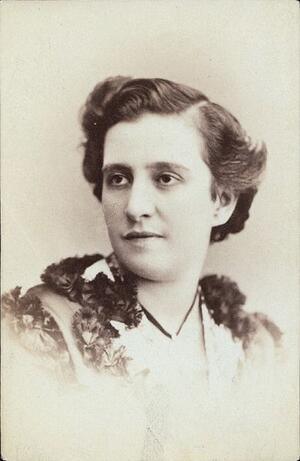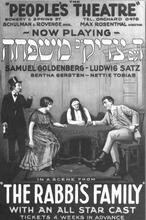Rose Eytinge
Rose Eytinge.
Photograph from Shakespeare's Heroines on the Stage, by Charles Edgar Lewis Wingate, 1895.
Reportedly the first American theater actress to earn a three-figure salary, Rose Eytinge was praised for her fiery, passionate performances. Eytinge began acting at age seventeen, performing in Albany and New York City. On a performance tour stop in Washington, she was invited to the White House by President Abraham Lincoln. Known for taking on physically demanding roles, Eytinge created the role of Laura Courtland in Augustin Daly’s Under the Gaslight. In 1869 she married George H. Butler, the US Consul General to Egypt, and they divorced in 1873. Eytinge joined the Union Square Theatre Company in New York and continued to perform there until her retirement in 1907. In 1905 she published her autobiography, Memories of Rose Eytinge, detailing her life in theater.
Article
Notorious for her fiery temperament, Rose Eytinge became one of the most popular female stars of the 1860s and 1870s. She was reputedly the first on the American stage to command a three-figure salary.
She was born in Philadelphia on November 21, 1835, to Rebecca and David Eytinge, a language teacher and translator. Her brother Samuel, also an actor, died in 1859. The family was likely related to the four Jewish merchant Eytinges, then working in Philadelphia, at least two of whom had emigrated from the Netherlands.
Rose Eytinge was schooled informally at home in Philadelphia and then Brooklyn until, at age seventeen, she embarked on a professional stage career. With the help of agent Charles Parsloe, she secured her first engagements, including one with the Green Street Theater in Albany, New York. She married the manager, David Barnes, in 1855 and bore a daughter, Courtney. By 1862, however, Eytinge and Barnes had divorced.
Eytinge then appeared in New York with legendary performers Edwin Booth, E. L. Davenport, and James Wallack. With the latter two stars, she toured Boston, Philadelphia, Baltimore, and Washington, where President Abraham Lincoln attended several of her performances and invited her to the White House. She distinguished herself in the playing of heroes driven to emotional and physical extremes, like Nancy Sykes in the stage version of Charles Dickens’s Oliver Twist. In 1867, she created the role of Laura Courtland in Augustin Daly’s hugely successful melodrama Under the Gaslight, which called upon her, amid the roar of a speeding train, to ax her way out of a locked toolshed and rescue a Civil War veteran bound to the railroad tracks.
Eytinge’s acting career went into hiatus for several years beginning in 1869 when she married and left the country with her second husband, George H. Butler, U.S. consul general to Egypt, with whom she bore two children. Writing about her sojourn in this “heathen land” in her autobiography, she assumed the perspective not only of an “American” but also of a “Christian” and an “Anglo-Saxon.” Indeed, nowhere in her autobiography, Memories of Rose Eytinge, does she refer to her Jewish heritage. Because of her husband’s abusive behavior, Eytinge divorced him and returned to New York, where she joined the Union Square Theatre Company in 1873.
Thereafter she played her most famous roles, the eponymous Rose Michel and Shakespeare’s Cleopatra, for which she utilized her Egyptian experience and props. In 1880, she married her third husband, actor Cyril Searle, but they separated in 1884. She gave her last performance in 1907 and died on December 20, 1911, in Amityville, New York.
Eytinge masked her Jewishness in her autobiography, and she never specialized in playing Jewish characters. The influential manager Daniel Frohman, himself of Jewish descent, however, referred to her as the “black-eyed, black-haired Jewess.” By contemporary social and theatrical standards, these attributes marked her for so-called female heavy roles involving displays of fierce passion, which thrilled audiences by transgressing bourgeois expectations of respectable womanly behavior
AJYB 14 (1912–1913):125.
Clapp, John Bouve, and Edwin Francis Edgett. Players of the Present. Vol. I (1899).
DAB; Eytinge, Rose. Clipping File. Harvard Theatre Collection, Cambridge, Mass..
Eytinge, Rose. Memories of Rose Eytinge (1905).
NAW; Obituary. NYTimes, December 21, 1911, 11:5.
Odell, George C.D. Annals of the New York Stage. Vols. 7–9 (1936–1937).
Robinson, Alice, Vera Mowry Roberts, and Milly S. Barranger, eds. Notable Women in the American Theatre: A Biographical Dictionary (1989).
Tompkins, Eugene, and Quincy Kilby. History of the Boston Theatre, 1854–1901 (1908).
Young, William C. Famous Actors and Actresses on the American Stage. Vol. I (1975).
Wolf, Edwin, and Maxwell Whiteman. The Jews of Philadelphia, from Colonial Times to the Age of Jackson (1957).
WWWIA 1.




